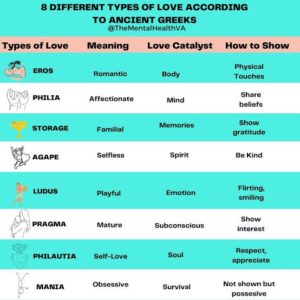The ancient Greeks recognized and categorized eight distinct types of love, each with its own unique characteristics and significance. These types of love provide a nuanced understanding of the complexities of human relationships.
1. Philautia (Self-Love)
Philautia refers to love for oneself. It encompasses self-acceptance, self-care, and a healthy regard for one’s own well-being. Philautia is essential for maintaining a healthy sense of self-worth and for forming meaningful relationships with others.
2. Storge (Familial Love)
Storge is the natural affection between family members, particularly between parents and children. It is a deep and enduring bond based on shared experiences and mutual support. Storge provides a sense of belonging and security within the family unit.
3. Philia (Friendly Love)
Philia is the love between friends. It is a reciprocal relationship based on trust, respect, and shared values. Philia involves a deep understanding of each other’s strengths and weaknesses, and it can provide a lifelong source of support and companionship.
4. Eros (Romantic Love)
Eros is passionate and romantic love. It is characterized by intense physical attraction, emotional connection, and a desire for exclusivity. Eros can be both exhilarating and consuming, and it often serves as the foundation for long-term relationships.

5. Ludus (Playful Love)
Ludus is playful and flirtatious love. It is typically found in the early stages of a relationship and is characterized by lightheartedness and a lack of commitment. Ludus can be a fun and enjoyable experience, but it may not always lead to a deeper connection.
6. Mania (Jealousy)
Mania is obsessive and possessive love. It is characterized by extreme jealousy and a lack of trust. Mania can be destructive to relationships, as it creates an atmosphere of insecurity and mistrust.
7. Pragma (Enduring Love)
Pragma is a mature and committed love that has developed over time. It is based on mutual respect, understanding, and a shared life together. Pragma is often found in long-term relationships where the initial passion of Eros has evolved into a deeper and more enduring bond.
8. Agape (Universal Love)
Agape is unconditional and selfless love. It is a divine or universal love that extends to all beings, regardless of their differences or shortcomings. Agape is the highest form of love and is often associated with spiritual enlightenment and compassion.
The ancient Greeks’ categorization of love provides a comprehensive framework for understanding the complexities of human relationships. Each type of love has its own unique qualities and contributes to our overall well-being and happiness. By embracing the different types of love, we can cultivate fulfilling and meaningful connections with ourselves, our loved ones, and the world around us.

 Pazionmedia.com Pazion Media l Latest News l Politics l Sports l Entertainment
Pazionmedia.com Pazion Media l Latest News l Politics l Sports l Entertainment



